新概念二第21-24课知识点汇总
新概念二Lesson 24 知识点整理

Lesson 24 It could be Worth 不幸中的万幸学习目标全必记单词manager n. 经理upset adj.不安的sympathetic adj. 表示同情的complain v. 抱怨honesty n. 诚实contain v. 包含,内装wicked adj. 很坏的, 邪恶的常考短语complain (of/about sth) to sb. 对某人/向某人抱怨this wicked world 这个邪恶的世界start to do 开始做某事be interrupted by 被……打断经典句型1.I entered the hotel manager's office and sat down.2.I had just lost $50 and I felt very upset.3.The manager was sympathetic, but he could do nothing.4.'Everyone's losing money these days,' he said.重点语法感叹句What + a/an +adj. +可单+ 主语+谓语动词What a pretty girl she is !What +adj.+ 可复+主语+ 谓语动词What pretty girls they are !What + adj.+不可数名词+主语+谓语动词What clear water it is !How +adj./adv.+主语+谓语How pretty the girl is !How +adj./adv.+a/an+可单+主语+谓语How pretty a girl she is !How + 句子How time flies!解教材全解1. I entered the hotel manager's office and sat down.我走进饭店经理的办公室,坐了下来。
新概念第二册第二十四课笔记
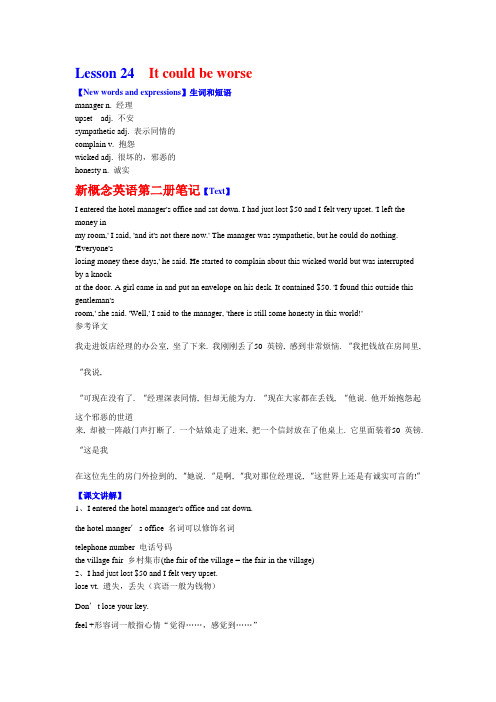
Lesson 24 It could be worse【New words and expressions】生词和短语manager n. 经理upset adj. 不安sympathetic adj. 表示同情的complain v. 抱怨wicked adj. 很坏的,邪恶的honesty n. 诚实新概念英语第二册笔记【Text】I entered the hotel manager's office and sat down. I had just lost $50 and I felt very upset. 'I left the money inmy room,' I said, 'and it's not there now.' The manager was sympathetic, but he could do nothing.'Everyone'slosing money these days,' he said. He started to complain about this wicked world but was interrupted by a knockat the door. A girl came in and put an envelope on his desk. It contained $50. 'I found this outside this gentleman'sroom,' she said. 'Well,' I said to the manager, 'there is still some honesty in this world!'参考译文我走进饭店经理的办公室, 坐了下来. 我刚刚丢了50 英镑, 感到非常烦恼. “我把钱放在房间里, “我说,“可现在没有了. “经理深表同情, 但却无能为力. “现在大家都在丢钱, “他说. 他开始抱怨起这个邪恶的世道来, 却被一阵敲门声打断了. 一个姑娘走了进来, 把一个信封放在了他桌上. 它里面装着50 英镑.“这是我在这位先生的房门外捡到的, “她说. “是啊, “我对那位经理说, “这世界上还是有诚实可言的!”【课文讲解】1、I entered the hotel manager's office and sat down.the hotel manger’s office 名词可以修饰名词telephone number 电话号码the village fair 乡村集市(the fair of the village = the fair in the village)2、I had just lost $50 and I felt very upset.lose vt. 遗失,丢失(宾语一般为钱物)Don’t lose your key.feel +形容词一般指心情“觉得……,感觉到……”feel upset 心烦意乱,很苦恼3、The manager was sympathetic, but he could do nothing.could do nothing= could do nothing about it 对此事无能为力I could do nothing to help you. 我没有办法帮你, 我无能为力Can you help me?Sorry,I could do nothing for you. / Certainly. Of couse. It’s my pleasure.4、'Everyone's losing money these days,' he said.days可以指“时期,时代”,如in his boyhood days(在他的童年时代)。
新概念2 1~24课语法点

新概念1~24课语法点Lesson1-6语法点1.简单陈述句①完整的结构:主语+谓语+宾语+方式状语+地点状语+时间状语I played basketball happily on the playground yesterday.②两种基本结构主系表:She is nervous./She is a secretary.主动宾:Jenny caught a fish./Jenny likes going sailing.2.一般现在时①经常性或习惯性的动作,常与表示频度的时间状语连用。
时间状语:every…, sometimes, on Sundays。
例如:I leave home for school at 7 every morning. 每天早上我七点离开家。
②客观真理,客观存在,科学事实。
例如:The earth moves around the sun. 地球绕太阳转动。
③主语的状态、能力、性格、个性。
例如:She is a lovely girl.动词三单变化规则:情况构成方法读音例词一般情况加-s 清辅音后读/s/浊辅音和元音后读/z/swim-swims;help-helps;like-likes以o结尾的词加-s或-es 读/z/ tomatoes;potatoes;photos 以ce,se,ze,ge等结尾的词加-s 读/iz/ prices;cases;oranges以s,sh,ch,x等结尾的词加-es 读/iz/ teach-teaches;bus-buses以辅音字母+y结尾的词变y 为i再加es读/z/ study-studies3.what和how引导的感叹句基本结构:What+a/an+形容词+名词(+主语+谓语)!例:What a beautiful girl she is!How+形容词+a/an+名词(+主语+谓语)!例:How beautiful a girl(she is)!区别:①what重点修饰名词,how重点修饰形容词②how只能修饰单数可数名词,what可以修饰可数名词单/复数、不可数名词3.一般过去时(动词过去时不规则变化表、时间状语)一般过去时由动词的过去式表示,表示过去发生的动作或状态。
新二1-24语法整理
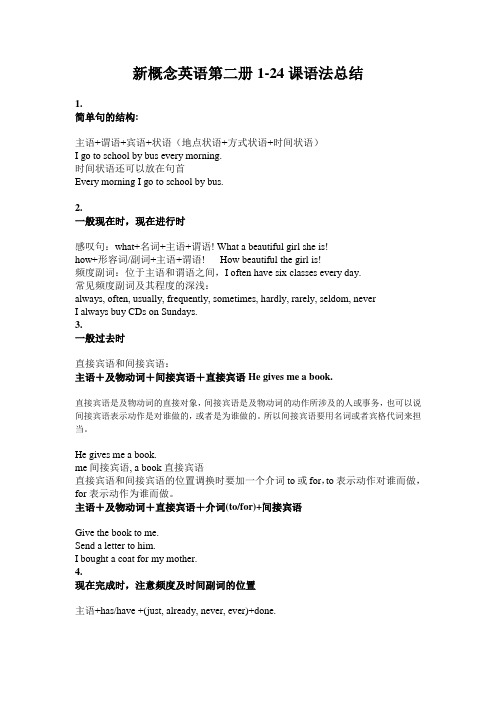
新概念英语第二册1-24课语法总结1.简单句的结构:主语+谓语+宾语+状语(地点状语+方式状语+时间状语)I go to school by bus every morning.时间状语还可以放在句首Every morning I go to school by bus.2.一般现在时,现在进行时感叹句:what+名词+主语+谓语! What a beautiful girl she is!how+形容词/副词+主语+谓语! How beautiful the girl is!频度副词:位于主语和谓语之间,I often have six classes every day.常见频度副词及其程度的深浅:always, often, usually, frequently, sometimes, hardly, rarely, seldom, neverI always buy CDs on Sundays.3.一般过去时直接宾语和间接宾语:主语+及物动词+间接宾语+直接宾语He gives me a book.直接宾语是及物动词的直接对象,间接宾语是及物动词的动作所涉及的人或事务,也可以说间接宾语表示动作是对谁做的,或者是为谁做的。
所以间接宾语要用名词或者宾格代词来担当。
He gives me a book.me间接宾语, a book直接宾语直接宾语和间接宾语的位置调换时要加一个介词to或for,to表示动作对谁而做,for表示动作为谁而做。
主语+及物动词+直接宾语+介词(to/for)+间接宾语Give the book to me.Send a letter to him.I bought a coat for my mother.4.现在完成时,注意频度及时间副词的位置主语+has/have +(just, already, never, ever)+done.I have just graduated from Yincheng Primary school.5.复习:一般过去时与现在完成时的区别主语+did sth+过去的时间状语.I went to Xuanwu Lake Park three days ago.主语+has/havedone+yet/since/for/so far.I have just been to Beijing.in the way/on the way/in this way/by the way/in a way/get out of my way/Don’t stand in my way./by the way/no wayspare/to spare6.冠词用法(一)1.不定冠词用于修饰单数可数名词,当一个单词的第一个发音为元音时要用冠词an, 如果是辅音用a即可。
新概念第二册第二十四课

用现在进行时表示不断重复或者反复发生的 动作,带有说话人的主观色彩。 You are always talking in class. He is always changing his mind.
无忧PPT整理发布
ห้องสมุดไป่ตู้
He started to complain about this wicked world but was interrupted by a knock at the door.
I felt upset when I broke the vase. 我走进他的办公室,感到非常烦恼。
sympathetic adj. [simpə’θetik]
be ~ to/ towards sb. 同情 一个有同情心的朋友 a sympathetic friend sympathy n['simpəθi]
无忧PPT整理发布
'I left the money in my room,' I said, ' and it's not there now.'
leave left left leave sth somewhere 把某物落在某地
无忧PPT整理发布
The manager was sympathetic, but he could do nothing.
Honest 诚实的, 坦率的 坦诚的 dishonest He is an honest man. Thank you for being so honest with me. Be honest with sb about sth To be honest, it was one of the worst books I’ve ever read.
新概念英语第二册课堂笔记:第24课
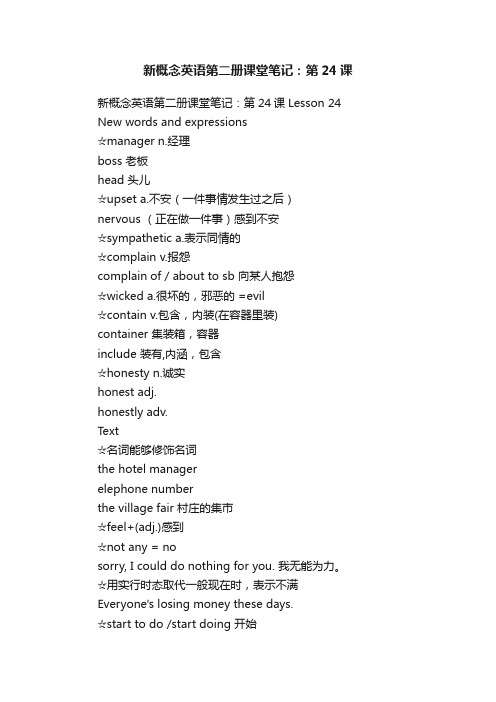
新概念英语第二册课堂笔记:第24课新概念英语第二册课堂笔记:第24课Lesson 24 New words and expressions☆manager n.经理boss 老板head 头儿☆upset a.不安(一件事情发生过之后)nervous (正在做一件事)感到不安☆sympathetic a.表示同情的☆complain v.报怨complain of / about to sb 向某人抱怨☆wicked a.很坏的,邪恶的 =evil☆contain v.包含,内装(在容器里装)container 集装箱,容器include 装有,内涵,包含☆honesty n.诚实honest adj.honestly adv.Text☆名词能够修饰名词the hotel managerelephone numberthe village fair 村庄的集市☆feel+(adj.)感到☆not any = nosorry, I could do nothing for you. 我无能为力。
☆用实行时态取代一般现在时,表示不满Everyone's losing money these days.☆start to do /start doing 开始☆outside prep. & adv.I find this outside this gentleman's room.out of 从...到外面去,一定要和有实在意义的动词连用,get/go/come out ofout adv.在...外面(不能跟名词)☆lose / miss / go away / disappearlose 丢失,人丢失sth lose sth./sth. be lostmiss 怀念,错过,丢失(missing adj.) sth.is missingMY keys are lost/missing.I lose my book./My book lost(is missing).只能用missing,人丢了,MY child id misssing.失踪的孩子 missing boygo 走 sth. is gonebe gone 不见了 Gone with wind 飘(随风而逝),My book is gone.go away 离开(人走),something is gone. disappear 不见了(瞬间)没有被动语态sth./sb. disappear/disappearedbe disappearing 慢慢地不见了His money disappeared.。
新概念英语第二册笔记-第24课
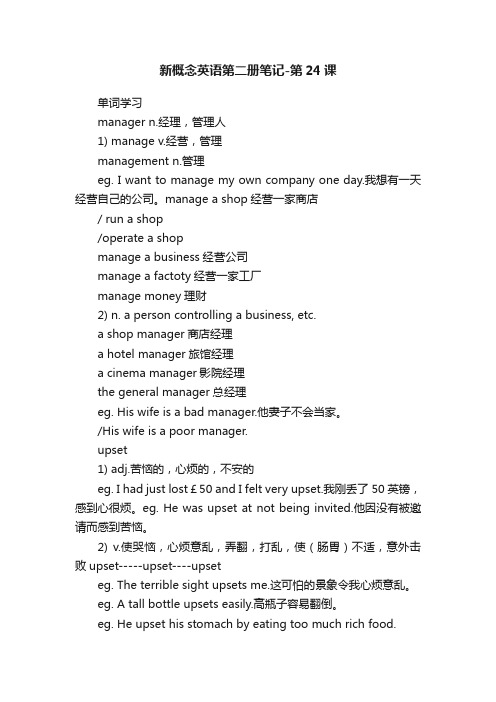
新概念英语第二册笔记-第24课单词学习manager n.经理,管理人1) manage v.经营,管理management n.管理eg. I want to manage my own company one day.我想有一天经营自己的公司。
manage a shop经营一家商店/ run a shop/operate a shopmanage a business经营公司manage a factoty经营一家工厂manage money理财2) n. a person controlling a business, etc.a shop manager商店经理a hotel manager旅馆经理a cinema manager影院经理the general manager总经理eg. His wife is a bad manager.他妻子不会当家。
/His wife is a poor manager.upset1) adj.苦恼的,心烦的,不安的eg. I had just lost£50 and I felt very upset.我刚丢了50英镑,感到心很烦。
eg. He was upset at not being invited.他因没有被邀请而感到苦恼。
2) v.使哭恼,心烦意乱,弄翻,打乱,使(肠胃)不适,意外击败upset-----upset----upseteg. The terrible sight upsets me.这可怕的景象令我心烦意乱。
eg. A tall bottle upsets easily.高瓶子容易翻倒。
eg. He upset his stomach by eating too much rich food.他吃了太多油腻的东西感到胃不舒服。
eg. Don’t be upset by trifles ['traifl] .不要为小事烦恼。
(完整word版)新概念二册词组总结1-24课,推荐文档.docx
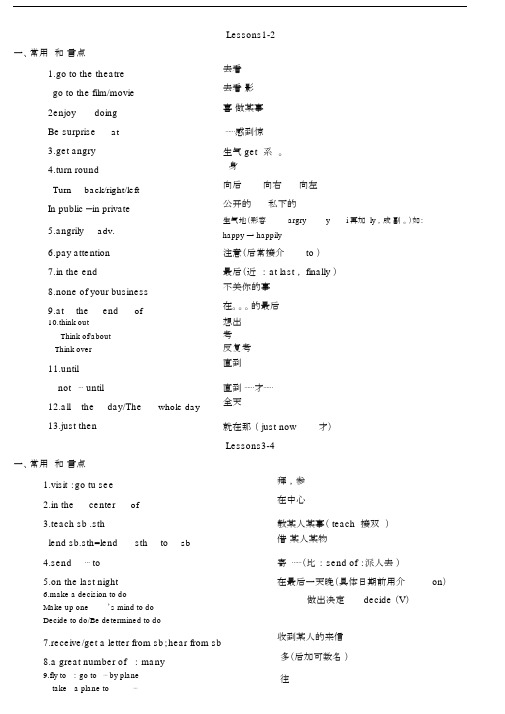
一、常用和言点1.go to the theatrego to the film/movie2enjoy doingBe surprise at3.get angry4.turn roundTurn back/right/leftIn public —in privateLessons1-2去看去看影喜做某事⋯⋯感到惊生气 get 系。
身向后向右向左公开的私下的生气地(形容argry y i 再加 ly ,成副。
)如:5.angrily adv.6.pay attention7.in the end8.none of your business9.at the end of10.think outThink of/aboutThink over11.untilnot⋯until12.all the day/The whole day13.just then一、常用和言点1.visit :go tu see2.in the center of3.teach sb .sthlend sb.sth=lend sth to sb4.send⋯to5.on the last night6.make a decision to doMake up one’s mind to doDecide to do/Be determined to do happy → happily注意(后常接介to )最后(近: at last , finally )不关你的事在。
的最后想出考反复考直到直到⋯⋯才⋯⋯全天就在那( just now才)Lessons3-4拜,参在中心教某人某事( teach 接双)借某人某物寄⋯⋯(比: send of :派人去)在最后一天晚(具体日期前用介on)做出决定decide (V)7.receive/get a letter from sb;hear from sb收到某人的来信8.a great number of : many多(后加可数名)9.fly to : go to ⋯ by plane往take a plane to⋯10.the number of一、常用和言点1.at the aiport2.try to do⋯3.try doing4.keep guard5.to one’ s surpriseExpect sb to doto one’ s excitementto one’ s pointmentdisap6.be full of7.enter for8.win+比 /Defeat+手一、常用和言点1.be five miles from+地点2. cover3.ask sb to doRequest sb to do4.up to now=so far =5.a great many+可数名6.on the way to7.one , the other8.in this way9.move to10.knock at11.ask for12.in a way13.in return for⋯14.stand on one’ s head15.go away16.call at=visit17.in the way⋯.的数量Lessons7-8在机( at“点”)法做(不一定成功)做守令某人惊的是期望令人的是令人失望的是装(近be filled with)名参加(考等)打Lessons5-6离⋯⋯5英里( 1)覆盖,常用作be covered with由⋯⋯覆盖(2) +距离,相当于 travel要求到在止多,大量在路上一个,另一个(共两者)以种方式,用种方法搬到敲⋯⋯要⋯⋯(注意区 ask “”)在某种程度上做⋯⋯的回倒立走开光,拜路By the way便一下祈求18.Beg for19.enter = go into进入Enter for = take part in参加20.knock out击倒Knock over打翻Knock off停止工作中断一、常用和言点1.on Wednesday evening2.a crowd ofa large crowd of3.theminute/hour/seconf/handBe made ofBe made fromBe made intoBe made in4.refuse to do5.at that moment6.belong to7.allow doing8.allow sb.to do⋯9.a friend of my father一、常用和言点1.a lawyer’ s office2.borrow ⋯ from3.pay back4.pay for物5.salary 工 Wages工6.set out/off7. plenty of可数/不可数8.say goodbye to⋯9.be away10.be proud of11.arrive---be here /thereLeave----be awayDie -----be deadLessons9-10等词前有具体的限定词时,一般用介词on;如果限定词为this ,that , last , next等时不用介词。
- 1、下载文档前请自行甄别文档内容的完整性,平台不提供额外的编辑、内容补充、找答案等附加服务。
- 2、"仅部分预览"的文档,不可在线预览部分如存在完整性等问题,可反馈申请退款(可完整预览的文档不适用该条件!)。
- 3、如文档侵犯您的权益,请联系客服反馈,我们会尽快为您处理(人工客服工作时间:9:00-18:30)。
沪江21-24一、词汇精讲madadj. 1)生气的【固定搭配】 be mad at sb. 对某【例句】 She defended her childr 她保护着孩子免受疯狗 2)痴迷的【固定搭配】be mad about 对【例句】 I ’m mad about him. 我很迷他。
3)发疯的,发狂的【例句】 She went mad after the儿子死后她就疯了。
【拓展记忆】 go+ adj. 变得……go mad/ wild/ insaaeroplanen. 飞机【记忆方法】 aero-空气(的);aero-+plane → aerobic exercisereasonn. 原因,理由【词义辨析】reason & cause & p reason 对某事的解释,理由【例句】 Give me one good reaso 给我一个好的理由。
cause 产生某结果的原因沪江英语绿宝书之新概念224课 知识点汇总对某人生气,发火 children from the mad dog.受疯狗伤害。
……痴迷,着迷er the death of her son. 。
d/ insane/bananas 情绪失控,发疯的);航空(的) aeroplane=airplanecise 有氧健身运动(cycling, swimming, jogging) e & purposed reason.。
【例句】The heavy storm was the cause of the accident.猛烈的暴风雨是造成这起事故的原因。
purpose 心中渴望要实现的目标【例句】Their purpose is to attract attention to this issue.他们的目的是吸引人们对该问题的关注。
v. 劝说;推理【固定搭配】reason with sb. 和某人讲道理,说服某人【例句】I tried to reason with her but she locked herself in the bedroom.我试着和她讲道理,但她却把自己锁在卧室里。
【英美文学】Interpretation of Dreams Sigmund Freud 弗洛伊德的《梦的解析》I Have a Dream Martin Luther King 马丁·路德·金的《我有一个梦想》【例句】I had a really weird dream last night.我昨天晚上做了个很怪的梦!【常见用法】the house/job/boy,girl...of your dreams 梦中的,梦寐以求的【例句】I’ve just met the man of my dreams!我刚刚遇到了我的梦中情人。
v. 做梦,梦见【固定搭配】dream of/about【例句】I dreamed about you last night.我昨天晚上梦到你了。
agen. 年龄;时代【常见用法】at the age of seventeen 17岁Ice Age 《冰河世纪》【例句】We’re living in the computer age.我们生活在计算机时代。
channeln. 1)海峡,航道the English Channel 英吉利海峡2)频道【例句】It’s so boring! Please switch to another channel.好无聊啊,换个台吧。
【拓展记忆】Chanel 香奈儿completev. 完成(to finish doing sth., esp. when it has taken a long time.)【例句】The building took two years to complete.这座大楼花了两年时间才建成。
【固定搭配】complete doing sth. 完成某事adj. 完整的,全部的【例句】Is this pack of cards complete?这副牌全么?【常见用法】the complete works of ……的作品全集the complete works of Lu Xun 鲁迅全集【词性拓展】completely=totally adv. 完整地,完全地,彻底的【例句】I felt completely relaxed.我觉得完全放松下来了。
modernadj. 新式的,时髦的【词性拓展】modernization n. 现代化,现代化的事物Four Modernizations 四个现代化workn. 1)工作【例句】Mary left college a year ago and she’s still looking for work.玛丽一年前大学毕业,她现在仍在找工作。
2)做的事情,下的功夫【例句】The house must have taken a lot of work.这幢房子一定花了很多功夫才建好。
3)作品,著作【例句】the Collected Works of Shakespeare 莎士比亚作品集strangeadj. 奇怪的; 生疏的【例句】That’s strange. I was sure Jessica was right here a second ago.真奇怪!我肯定几秒钟前杰西卡还在这儿的。
【词性拓展】stranger n. 陌生人【例句】Children must not talk to strangers.孩子们不可以和陌生人说话。
managern. 经理【常见用法】regional manager 地区经理the General Manager 总经理【词性拓展】manage v. 经营,管理【例句】He manages a hotel for his father.他替他父亲经营一家旅馆。
【固定搭配】manage to do sth. 成功做某事【例句】How did you manage to get their approval?你怎么得到他们的同意的?upsetadj. 不安的【固定搭配】be upset about 感到不安的【例句】He was horribly upset over her illness.他为她的病而忧心忡忡。
【词义辨析】upset & nervousupset: 事情发生后感到不安nervous: 事情发生前感到紧张sympatheticadj. 表示同情的【例句】He is a sympathetic person.他是一个有同情心的人。
【词性拓展】1) sympathy n. 同情,同情心【固定搭配】feel/have sympathy for sb. 同情某人2) sympathize v. 同情【固定搭配】sympathize with 对……表示同情,吊慰【例句】We all sympathize with you in your bereavement.我们对你丧亲之痛表示同情。
complainv. 抱怨【固定搭配】complain about【例句】You've got nothing to complain about.你没什么可抱怨的。
【口语】can’t complain 还好【例句】Menopause makes me upset, but I can’t complain.更年期让我很心烦,但还好。
containv. 包含,内装【例句】The cup contains water.杯子里装着水。
【词性拓展】container n. 容器honestyn. 诚实,坦诚,正直【例句】We've never doubted her honesty.我们从没怀疑过她的诚实。
【词性拓展】honest adj. 诚实的,实在的honestly adv. 真诚地,公正地【常见用法】to be honest=honestly 老实说二、词汇补充1. V.+ ofaccuse of 指控,控告approve of 同意assure of 保证;弄清楚,查明beware of 对……小心boast of 吹嘘complain of 抱怨consist of 由……组成convince of 使……相信cure of 医治,治好……病despair of对……感到绝望dream of梦见,梦想;渴望expect of对……期望(要求)hear of听说,得悉get rid of 摆脱;解脱;除去;弄死smell of有……的味道;有点像……suspect of怀疑think of 想到;记起;考虑tired of 厌烦;厌倦warn of警告某人某事2. V.+ fromborrow from 从……借defend from防卫……以免于demand from向……要求;向……索取differ from与……不同;和……意见不一致dismiss from解雇;开除;消除draw from使……说出(真相等);汲取emerge from自...出现;摆脱出来escape from逃脱,逃离excuse from 免除hinder from阻碍, 使不能prevent from阻止,妨碍prohibit from禁止,阻止protect from保护receive from收到separate from分离, 分开suffer from患有某种疾病;忍受3. V.+ inbelieve in 相信;信仰delight in喜爱;以……为乐employed in 花时间做某件特别的事encourage in 鼓励engaged in使从事于,使忙于experienced in 在某方面有经验fail in在……上失败,变弱include in将……包括在内indulge in沉溺于,纵情于,饱享……instruct in 指导某人做某事interested in 对……有兴趣invest in投资于;投入;买进involved in涉及;包含在……中persist in坚持;固执于share in分享;分担;参加……4. V.+ onact on对……起作用,按……行动,作用于based on以……为基础,根据call on号召,邀请,访问comment on评论,对……加以评论concentrate on集中,全神贯注于congratulate on祝贺count on依赖,期待decide on 决定,确定depend on 依靠,依赖economize on节约,节省embark on 着手做某事experiment on对……进行实验insist on坚持要求……,坚持认为……lean on靠在…;依赖;对…施加压力live on继续生活;以……为主食;靠……生活operate on为……动手术;对……产生作用;靠……运转pride on使得意,以...自豪rely on 依赖;依靠vote on投票决定某事;表决某事write on就某问题写5. leavev. 1)离开【常见用法】leave a place 离开某地2)留下,丢下,遗忘【常见用法】leave sth./sb. somewhere 把某物/某人留下;丢下,遗忘【例句】I’ve left the kids with Anna.我把孩子们留给安娜照顾了。
